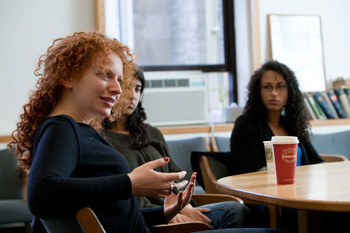Prisons class and drama ignited alumna's passion for alternatives to incarceration
Anya Degenshein '07 was a double major in government and sociology with a concentration in visual studies when she took government professor Mary Katzenstein's prisons class.

Anya Degenshein '07 talks to students in October about her job and career path as part of a "career conversation" sponsored by Career Services in the College of Arts and Sciences.
"It's one thing to be on campus and to talk about structural inequality, but it's a completely different thing to go out into a place and experience it, and that's what happens when you walk into a maximum security facility," Degenshein says. "… you go there and it is very powerful."
Now a court advocate in Manhattan for The Fortune Society, a nonprofit organization that provides alternatives to incarceration and services for those being released from prison, Degenshein helps get convicted felons who face a year or more in prison into one of the organization's programs.
"It's a great introduction to the field, to the legal system," says Degenshein, who deals regularly with judges, prosecutors and defense attorneys. "You just learn a lot, right away."
Katzenstein has seen quite a few students whose interest in the field was sparked by taking her class. "In the prisons course, the guest speakers mess with our minds," she says. "Whether they are correctional facility superintendents, police officers or men or women who have spent many decades behind bars, they often unsettle our standard preconceptions."
Right after graduation, Katzenstein asked Degenshein, who had some theater background, to be a teaching assistant for the first acting class that the Cornell Prison Education Project would be running at the Auburn Correctional Facility, a maximum security prison, that summer. Degenshein helped run the course, which was taught by Carolyn Goelzer, then a Resident Professional Teaching Associate with the theater department. The experience, Degenshein says, "really cemented my interest in incarceration. … All my interests and abilities were harnessed. I knew at that point I wanted to continue with criminal justice, to pursue that field."
After a year teaching English in Chile, Degenshein, with Katzenstein's help, connected with The Fortune Society and was offered a job to replace a Cornell alumna who was leaving.
At The Fortune Society
The general philosophy behind the types of alternatives to incarceration programs like The Fortune Society's is to "keep people in their communities and to give them the resources to become productive members of society," Degenshein notes, "rather than to send them away to prison where they will be completely isolated."
Katzenstein adds: "Fortune is one of the truly extraordinary organizations dedicated to supporting people making the difficult trek from prison back into jobs, family life and into the role of citizens who give back to their community. It's organizations like Fortune or the Osborne Association, or the Delancey Street Foundation that provide some reassurance, even in these times, that society's commitment to the welfare of the least advantaged still prospers."
Degenshein says her biggest challenge is the system itself. "There is a feeling of powerlessness, and I'm operating in this system that is broken, even when I'm able to do good work."
Success in her job "is not always so obvious; it's not always what you would imagine it to be," she says. "Sometimes it's about having a client be able to believe in themselves more than they did before, or seeing that they're a worthy member of society."
A return to Cornell
In October, Degenshein spoke to students about her work in a "career conversation" event sponsored by Career Services in the College of Arts and Sciences. The students asked about her job duties and if she ever feels unsafe in her job (she never has, and generally has very good relationships with her clients).
They also kept asking about Degenshein's career path. "It's funny to say this, but I guess it's nontraditional," she explains. "The ways you're conditioned to think as a student -- there's a lot of pressure when you're at an Ivy League school to think about your career path and [whether you're] going straight to law school or going straight to medical school, and, if you're not doing that, are you a failure in life?
"I think it was a relief for some of them to hear, 'No, you're not a failure in life and you can still do interesting things,' and what your interests are can be shaped by your experiences," she says. "You can be open to what speaks to you and what you're passionate about."
"Her story … is a great example of the importance of networking with Cornell professors and alumni and of following the interests one develops during one's undergraduate years," said Elizabeth Soltan '12, who attended the career conversation. "As a student considering law careers, it was great to hear from someone who had managed to turn her interest in criminal justice into a way to help people without stepping onto the conventional law school conveyor belt."
Degenshein is hoping to go to graduate school next fall to pursue a Ph.D. in the field of criminal justice.
Links: